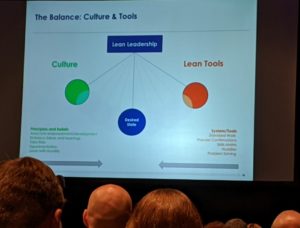3 Tips for Improving Your Lean Initiative
3 minutes, 20 seconds read

Northeast Lean Conference Recap
The Northeast Lean Conference just wrapped up in Boston, sending attendees home with fantastic tips to drive their Lean programs forward. Perhaps the strongest message to come out of this event was the idea that continuous improvement takes ongoing work. There’s no end destination when it comes to Lean, and that includes—as one presenter pointed out—updating how we think of Lean itself.
We walked away with three main takeaways we hope will help you finetune your improvement programs.
1. There’s no replacement for culture
Did you know 79% of employees leave their current jobs due to poor company culture? Amy Ferrero, head of client services at MassMutual Insurance Operations, does. She shared that statistic during her keynote presentation as she described how a culture shift drove the transformation that snagged her company the 2017 Shingo Medallion Award for operational excellence.
At the beginning of its continuous improvement journey, the MassMutual team focused on using all the right Lean tools and strategies. However, employee surveys revealed that the frontline wasn’t seeing or feeling improvement. The company was missing a corresponding shift toward an improvement culture.
Once the company went all in on investing in Lean culture, it achieved the bold goal of removing 10,000 hours from bureaucratic processes in the first year and 20,000 hours in the second year. Among the programs driving this success was the Reaching for the Stars initiative. A panel of peers evaluates submitted improvement ideas and votes on the ones they liked the best.
As Ferrero pointed out, there must be a balance between culture and Lean tools to properly execute a continuous improvement program.
2. It’s PDCA, not PDWA
To many organizations forget what PDCA really means: Plan, Do, Check, Adjust. Instead, they Plan, Do, Walk Away. In fact, this is a leading reason as to why most organizations fail at Lean execution.
For improvement initiatives to be effective, organizations must recheck the improvements to acknowledge mistakes, account for any errors and try again. Improvement is not a “one and done” type program. Ignoring this step is likely to cause more issues rather than solving anything at all. Successfully implementing PDCA means having one person always be accountable for testing that improvements are working as expected.
3. To survive, Lean must modernize
Keynote presenter Alan Robinson, award-winning author and professor at UMass Amherst opened with some surprising speculation for this Lean-focused conference: Has the Lean movement run its course?
He had plenty of evidence to back this up. In manufacturing, where Lean has its roots, the state-of-the-art in Lean far exceeds the state of the practice. Few organizations do Lean well. Most struggle with it or their senior leaders don’t take it seriously.
Elsewhere, Lean faces even more trouble. In healthcare, physicians (who should be all for improvement) run from the idea of Lean. While many government organizations have Lean initiatives, only a handful have been truly successful. Most business schools today give short shrift to Lean. Tomorrow’s leaders are being developed with little understanding of it.
That’s because Lean must morph to better fit the nature of work and organizations today, Robinson said. He pointed out that the core philosophies and principles of Lean are more important today than they have ever been. To become more mainstream, Lean must let go of some of its outdated legacy concepts.
So what will the “new Lean” look like? According to Robinson, new Lean has a high focus on people, particularly the frontline. Roughly 80% of an organization’s performance improvement potential lies in frontline ideas, and only 20% in management-driven initiatives.
Here at Rever, we couldn’t agree more about the power of the frontline in driving continuous improvement. We’re dedicated to helping companies improve by harnessing the powerful knowledge base working in the heart of their operations.
Like this content? Sign up for our Newsletter
[hubspot type=form portal=561211 id=fda6d445-739e-4072-8dae-68b94971a266]THE FRONTLINE DOJO
More Articles
How to develop the next billion Knowledge Workers
3 minutes, 51 seconds read
Digital transformation in manufacturing is not what you think it is
10 minutes, 36 seconds read
The human side of change management: lessons learned from Toyota, Airbus, and Silicon Valley
1 minute, 28 seconds read
The true meaning of Genchi Genbutsu
3 minutes, 5 seconds read
